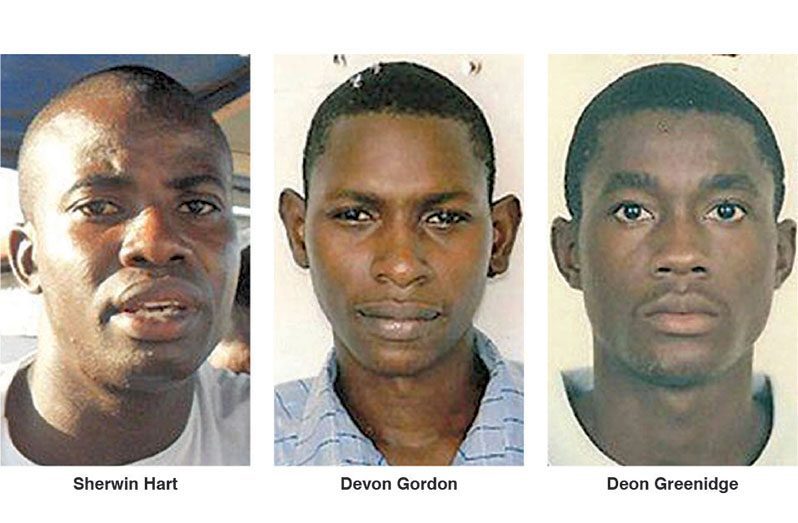–wants it declared unconstitutional
DISSATISFIED that the Court of Appeal has declined to declare the death penalty unconstitutional in Guyana, the Death Penalty Project (DPP), a London-based non-governmental organisation (NGO), is considering approaching the Caribbean Court of Justice (CCJ) on the matter.
The organisation made its position known shortly after three soldiers, who were sentenced to death for the 2009 murder of Bartica gold dealer Dwieve Kant Ramdass, had their sentences commuted to life imprisonment.
In 2013, Sherwin Hart, Deon Greenidge, and Devon Gordon were found guilty of the capital offence of murder. They were later sentenced to death by hanging by Justice Franklyn Holder at the Demerara High Court.
According to a statement issued by the organisation, it offered assistance to the three appellants and supported their legal team in Guyana.
During the hearing of the appeal, the NGO provided evidence to the court from leading academics which showed that capital punishment does not act as a greater deterrent to crime than lesser forms of punishment, and that there is a growing consensus that capital punishment is inherently inconsistent with respect for the Rule of Law.
“The Court of Appeal did not accept these arguments, and has declined to declare capital punishment unconstitutional in Guyana. The Court of Appeal overturned the appellants’ sentences of death, on the basis that it was unconstitutional for the trial court to hand down the death penalty automatically without affording the appellants individualised sentencing hearings. The failure to do so was a breach of their constitutional rights,” the DPP said in its statement, adding that its legal team will now explore a further appeal to the CCJ, which is Guyana’s final appellate court.
According to the statement, the Co-Executive Director of the DPP, Saul Lehrfreund said: “Whilst we are pleased to see the three appellants removed from death row, the Court of Appeal’s approach to the constitutionality of the death penalty itself is extremely disappointing. The death penalty is inherently arbitrary and contrary to the constitutional rights of those who it affects.
“We remain resolved to abolishing the death penalty in Guyana and will work with the legal team, in this case, to mount an onward appeal to the Caribbean Court of Justice. Guyana remains the only country in South America to retain the death penalty and we call on the country’s leaders to take the necessary steps to abolish the punishment.”
Hart and Greenidge were represented by Trinidad-based attorney, Douglas Mendes, S.C., while attorney-at-law Latchmie Rahamat is on record for Gordon. Prominent local attorney Nigel Hughes and his associates appeared, pro bono, for the DPP.
The case was heard, virtually, before Chancellor of the Judiciary Yonette Cummings-Edwards, and Justices of Appeal Dawn Gregory and Rishi Persaud.
The defence counsels had argued that the imposition of the death sentence on their clients was severe. They appealed to the court to commute the sentence to a term of imprisonment.
They had also argued that the imposition of the mandatory death penalty was unconstitutional since it violated the constitutional right to protection from cruel, inhumane and degrading punishment as provided for in Article 141 of the Constitution.
The CoA in its ruling pointed out that the men were charged before amendments were made to the Criminal Law (Offences) Act Chapter 8:01.
Justice Gregory went on to explain that with the amendments, judges now have the discretion to impose the death sentence, imprisonment for life, or such other term he/she considers appropriate.
The court also found that it had the jurisdiction to entertain the case, but had advised that the constitutional arguments on the penalty be put to the High Court.
The CoA made it clear, however, that while the death sentence was being set aside; the conviction itself for the capital offence is being upheld.
The court ordered that Harte, who was the senior officer in command at the time, be eligible for parole after serving 25 years, while his subordinates, Gordon and Greenidge, be eligible for parole after 18 years.
Reports are that on August 20, 2009, the three men who were manning the Coast Guard RC 12 motorboat on the Essequibo River, made off with $17 million in cash which Ramdass was carrying in a box to Bartica for his employer, who is based in the city and operates a gold and diamond business.
The trio allegedly told investigators shortly after their arrest that they’d strangled Ramdass, took the money he was carrying, and threw his body overboard in the vicinity of Caiman Hole on the Essequibo River.



.jpg)








